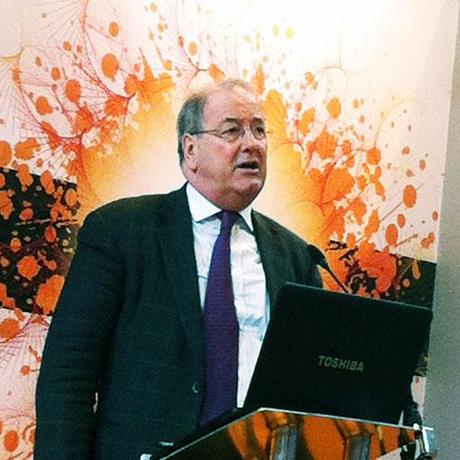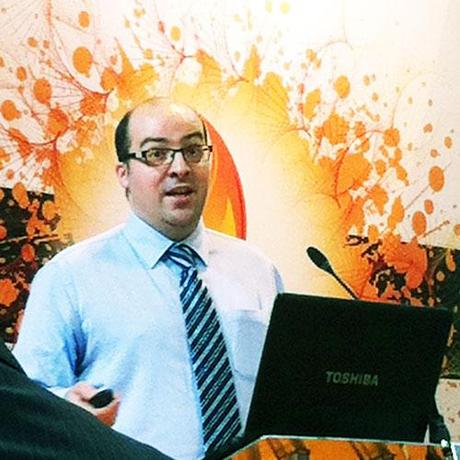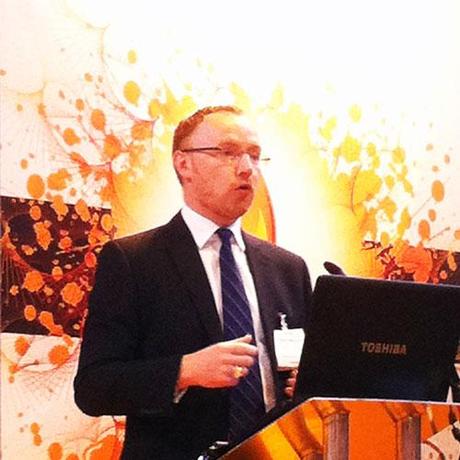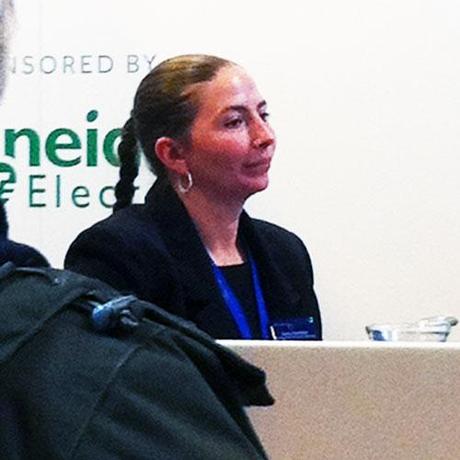
THE OPENING session in Energy Theatre 1 was on Energy Policy. The subject matter was technical and more relevant to people in industry than to customers, unless they take a special interest in policy.
Here are my notes. I’ve tried to explain the complicated bits and provide links wherever necessary.
Click below to skip to the section you want to read.
Chair – Andrew Warren, Association for Conservation of Energy (ACE)
Speaking about consequential improvement and his problem with Eric Pickles.
1st speaker – Patrick Erwin, Department for Energy and Climate Change (DECC)
Speaking about DECC's Levy Control Framework.
2nd speaker – Adam Davidson, Walker Morris
Speaking about the Electricity Market Reform.
Final speaker – Kerry Hamilton, CRC Energy Efficiency Scheme
Speaking about the CRC Energy Efficiency Scheme.
Introduction: Andrew Warren
ACE Director Andrew Warren chaired the session.

He gave a short personal intro before introducing the other speakers. Andrew wanted to make very clear that he is not paid by DECC though he does advise them on how to maximise the impact of the Green Deal, the government’s energy efficiency retrofit policy. He also wanted to get off his chest how unimpressed he is by Eric Pickles, Secretary of State for Communities and Local Government.
Andrew Warren’s beef with Pickles
To set the scene, Article 8 of the European Commission’s proposals for energy efficiency would mean that companies over a certain size who operate in any of the EU’s twenty eight member states have to undergo an energy efficiency test.
The Royal Institute of British Architects (RIBA) is concerned that new-builds frequently underperform in terms of energy efficiency. Andrew says Eric Pickles should be concerned by this non-compliance, and should insist that latest energy performance reports be displayed in company foyers. In fact Eric Pickles only requires the EPC rating to be displayed, which is only an estimated forecast. Buildings usually perform very differently when inhabited, something I learned more about later in the day.
The lawsuit
Consequential Improvement is a proposed piece of legislation that would mean any extension to a building must improve its overall energy performancy.
Andrew claims consequential improvement could drive 2.2 million Green Deals and that Eric Pickles had been keen on the idea until recently. So why has he backed out? Andrew believes the reason is Eric Pickles is afraid of being targeted by the Daily Mail with a campaign similar to the one about the ‘conservatory tax’. Here’s a bit more information.
Which led to a gentle fist fight
After Andrew Warren’s opening lament, a question came from someone in the audience who works in the building industry who STRONGLY disagreed with Andrew’s position on consequential improvement. The audience member is on the side of Eric Pickles, saying consequential improvement is just another obstacle to people giving business to the building industry, which is already suffering due to the recession. At this point Andrew Warren told him to stop ranting and ask a decent question, and I looked around for the popcorn vendor so I could enjoy the fight properly.
But there was no fight. The man suggested ACE spend more time resuscitating the Green Deal and leave the building industry alone. Andrew Warren had the last word, quoting a study that claimed 82% of the building industry is behind consequential improvement. Drama over.
Personally speaking…
… I don’t know if it makes sense to put our faith in projected figures - what if the maths doesn’t add up. On the other hand, why build unless it’s an improvement? The answer is probably somewhere in the middle.
Speaker #1 – Patrick Erwin, DECC
Patrick gave an overview of the Levy Control Framework and DECC’s upcoming policies. The Levy Control Framework explains the money available for various renewable technologies, and can be read here.

Patrick didn’t overcomplicate anything, but his subject matter was so dense and technical even skating shallowly across the surface felt hard to grasp the concepts and the implications.
He really came into his own during the Q&A session afterwards, answering questions plainly and authoratively.
.
Speaker #2 - Adam Davidson, Walker & Morris
Adam Davidson from law firm Walker and Morris gave us a ‘quick canter’ through what is and isn’t known about the Electricity Market Reform (EMR), including info on the capacity market, and strike prices.

(Quickly:
The capacity market insures against future energy shortages, blackouts and so on. Forecasting what our peak demand will be shows what we might need at times of shortage in the future. Capacity market agreements mean the cost of this electricity will be shared among energy suppliers if and when we ever need them to supply us with emergency power.
The strike price is the amount set between the normal price and the price during energy scarcity. Simultaneously, this gives those energy providers with capacity agreements the incentive to keep energy available, and protects consumers from hysterical pricing.
Adam went on to say no one knows for certain whether or not the EMR would interact with other schemes or financial incentives. Shortly after this a question came from the audience:
How will the Electricity Market Reform affect SMEs?
Patrick Erwin answered that CFDs (this refers to Contracts for Difference – definition can be found in the above link to the EMR) should make things more affordable actually, and provide opportunities for innovation.
Speaker #3 - Kerry Hamilton, CRC Energy Efficiency Scheme
The final speaker was Kerry Hamilton of the CRC Energy Efficiency Scheme, which is designed to target large companies’ carbon emissions – they make up 10% up the UK’s total emissions. As the CRC website says:
Organisations are eligible for the CRC if they (and their subsidiaries) have at least 1 half-hourly electricity meter (HHM) settled on the half-hourly market. Organisations that consumed more than 6,000 megawatt-hours (MWh) per year of half-hourly metered electricity during a qualification year are required to participate and must register with the Environment Agency, which administers the scheme.

Kerry kept the room in good spirits somehow – very impressive when all you’ve got to work with is CRC gibberish.
And that was more or less the first session.
